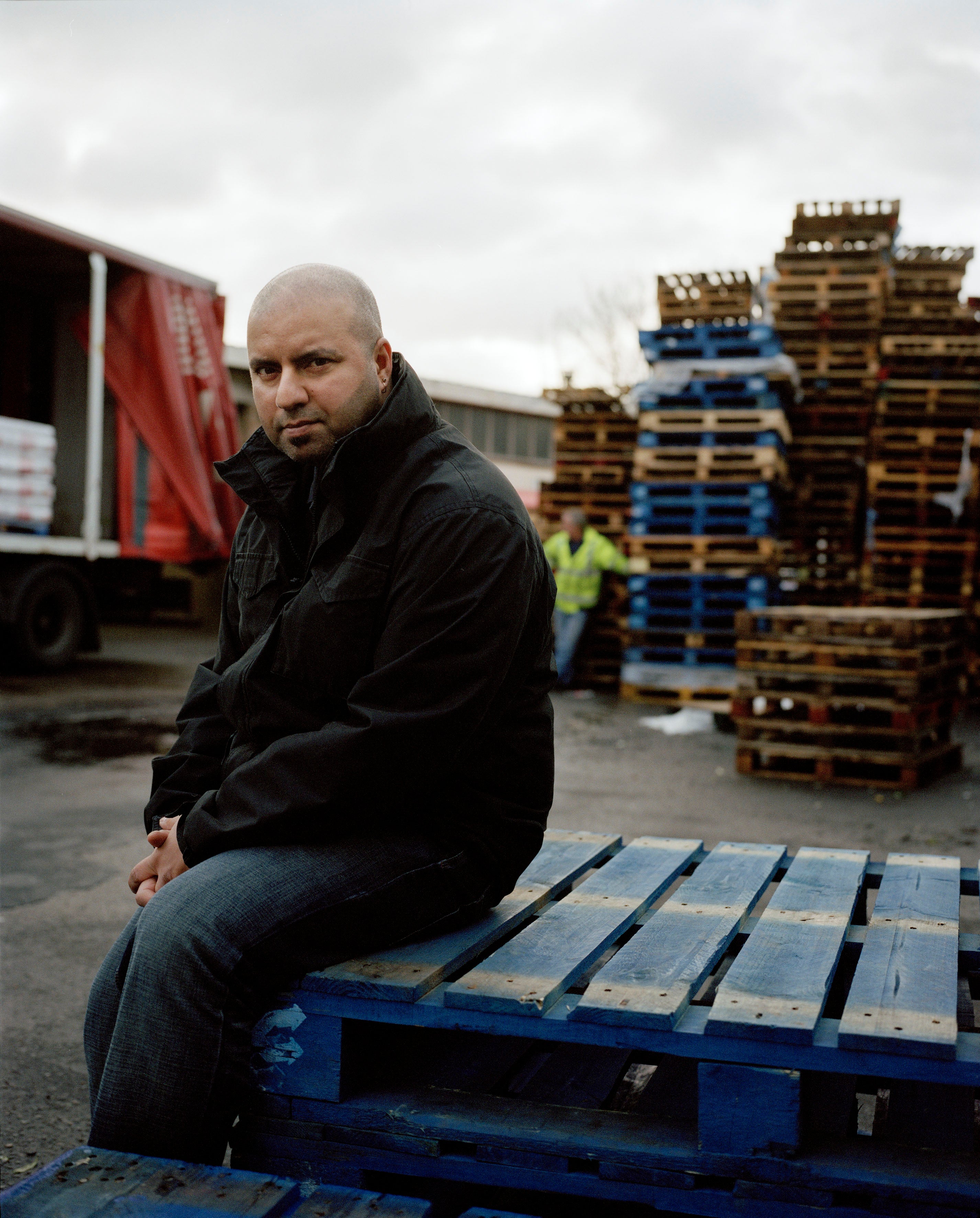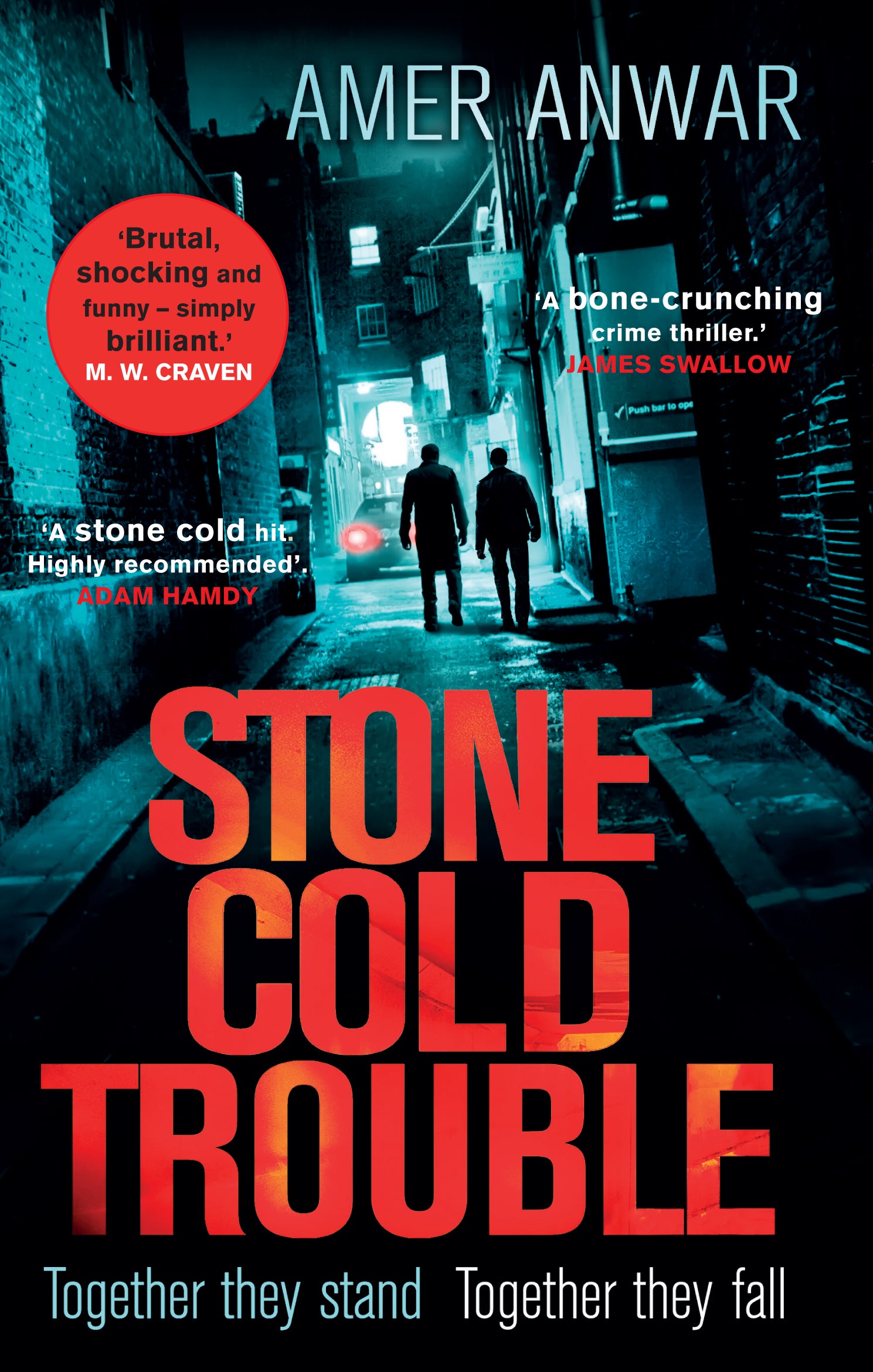How Amer Anwar pulled the wool over publishing’s eyes
The crime writer tells Heather Martin how he dreamed up a publisher and an editorial assistant to get his first novel published


His first book won a major prize before it was even written. His second was longlisted for the Crime Writers’ Association (CWA) Gold Dagger, one of the most prestigious awards in genre fiction. Life was easy, and success was handed to Amer Anwar on a plate. Only it wasn’t. The accolades were a tribute to his talent, but that was only part of the story. Because his books wouldn’t even exist were it not for his skill in the art of illusion.
When in 2008 Anwar submitted the first chapter of Brothers in Blood (then called Western Fringes) to the CWA for the Debut Dagger, he did so with the express purpose of failing. It was a rite of passage. “I needed to experience rejection,” he told me when we spoke recently over Zoom. He’d done his homework. He knew that a big part of being a writer was being knocked back. Might as well get it over with sharpish.
Instead, the judges picked Anwar as a winner. The next day he was contacted by four literary agents, all clamouring for the book. The only trouble was, he hadn’t written it yet. The agents were polite; they all asked to see it when it was done. But one, Jane Gregory, agent to queen of crime Val McDermid and clearly cannier than the rest, signed him regardless. Gregory asked how long it would take him to finish the book. He had no idea, but told her six months, to which she said nothing, but was possibly thinking that at that rate of production they could be on to a serious earner. It was five years before he sent her anything further to read. That was how long it took for him to reach a point where he felt that “the writing wasn’t completely pants”.
It’s not just that he’s a perfectionist. Nor was he lazy. It’s simply that life got in the way.
Anwar’s parents are first-generation immigrants from Pakistani Punjab. His father went to Edinburgh in the early Sixties to study accountancy, then moved to London to work for the Greater London Council. He returned to Pakistan to marry Anwar’s mother, 16 years younger and just out of high school, and set up house in Ealing, west London, which someone had told him was a good place to live. It was an arranged marriage, and not a happy one.
At the age of four Anwar was fluent in Punjabi – the Pakistani relatives couldn’t believe he was British. But his mother, Shahnaz, soon realised that in their predominantly white neighbourhood the family would need English to survive, so set about learning at the same time as her boys. She insisted they speak English with her. And when Amer brought reading books home from his state primary it was as much about him listening to her as the other way round.
Growing up I read books full of white characters, and that didn’t strike me as odd because that was what I was used to
I have the impression that Anwar is a warm and gregarious man, but there is a perceptible cooling when we speak about his father, as though he were recollecting the man from a distance. “My dad had a negative impact when he was around,” he told me. “He was obsessed with money, and kept it all to himself.” In order to provide for Amer and his younger brother, Shahnaz started taking in piece work as a seamstress, which she could do discreetly from home without bringing shame on her controlling husband. “If it wasn’t for her hard work, we wouldn’t have had any toys, games, new clothes, school uniforms or pocket money.”
Shahnaz asked for a divorce as her sons were entering their teens. Her husband sought custody “to make things difficult”, then when it came to the hearing said, “it’s fine, she can keep them”. Having forced his ex-wife to buy him out of the house, he ceased sending maintenance payments, which is when Shahnaz took on full-time factory work to cover the mortgage, working her way up to supervisory positions “because she was smart”. The boys became latchkey kids and learned to be helpful round the home.
The young Amer loved school and reading. He loved writing too, and to this day remembers basking in the warm glow of approval from teachers and friends when he read his stories aloud to the class – one was about a long-eared animal being chased by cavemen shouting ‘grab it’ and then the ‘g’ got dropped and it became ‘rabbit’.
Reading was an affordable pastime. He read boys’ comics like Beano and Dandy and Whizzer and Chips, then Warlord, Victor, Action and Commando. He was a regular visitor to the local library, but grew frustrated when he was prevented from borrowing books from the adult section. He wanted to explore forbidden territory. He wanted to be thrilled, excited, scared. “I could go to WHSmith on Ealing Broadway and with my pocket money buy any book I wanted.” He was too young to watch Alien on release, but “for one pound I could buy the novelisation and read it in all its detail. There was the chest-burster scene, the bit where the captain knocks the android’s head off – I loved it.” He devoured The Rats by James Herbert, and Sven Hassel’s brutal Second World War novels: “They were so violent, but so thrilling, in a way that books for children weren’t”.

Having left school at 16, Anwar took a year out before doing A-Levels in English, Art and Photography. But college sucked the life out of the subjects he loved, and the creativity too. He wanted to learn how to do things, not how to write about them. The only book he remembers enjoying was Our Mutual Friend, by Charles Dickens. “In the summer holidays I went and bought 11 books, all genre, because I had to get my fix of reading.” By then he was deep into American Noir: Elmore Leonard would help him find his voice; Walter Mosley would show him that people of colour could be the heroes of their own stories.
“Growing up I read books full of white characters, and that didn’t strike me as odd because that was what I was used to.” Despite the casual racism he endured as a boy, he’d never felt like an outsider, whether it was Eid or Christmas (he’s like his main character, Zaq, he tells me, “as religious as a bag of cement”).
At school he mixed with Chinese, Jamaican, Indian, Pakistani, Portuguese and Italian children. “The whole multicultural thing of London was the lived experience,” he said. What was weird and unusual was that it wasn’t represented in literature. It was then that he first thought of neighbouring Southall as a great setting for a crime novel. “Nobody’s done that before.” But he never really believed he would be the one to change things. Only his mother had encouraged his love of liberal arts. His photography and art tutors had referred his essays for plagiarism, convinced that no one of his background could have produced such excellent work. It’s hard to believe in yourself when others don’t. It was partly a class thing, like those academics who persist in arguing that no mere commoner could possibly have written Romeo and Juliet.
One of the reasons I wrote it was to represent my kind of background, and the characters I grew up with, who weren’t reflected in books
It was in Southall that the teenage Anwar discovered a sense of belonging in the Asian community. Yet he had the benefit of writerly detachment too, dropping in for weekends, hearing stories about colourful characters, about this or that guy who’d been jumped, then slipping away from the perils of gang culture to the leafy quiet of home. But it wasn’t until he was 36 that he would finally put pen to paper to write about Zaq Khan, an ex-con with a dead-end job at a builders’ yard and a dream of putting the past behind him – which means next thing you know he’s hunting down a runaway daughter and on the run himself, trapped in a spiralling web of deception, murder and revenge. Brothers in Blood is the definition of a gritty actioner.
For his first three years out of college Anwar worked in a fashion warehouse, climbing up and down the high racking to fetch clothes, packing boxes and loading them on to lorries, then doing it all again in reverse. He was the fittest he’d ever been, and having fun too, laughing and swearing with his mates, the radio on all day. “I had money, and for me that was a first. I was getting cash every week and helping out at home.” Then followed a short course in comic-strip art and business at the London Cartoon Centre, and a stint as a chalet rep in France, where he learned to snowboard in between cooking three-course dinners for eight people six days a week.
Which was when his mother said he would have to take over the mortgage. He talked his way through the door of Withers Repro and Print in Park Royal on the back of having bought his first Apple Mac, though he hadn’t a clue how to use it. As always, he got on well with everyone, picking up the skills he needed from the guy sitting next to him, who happened to be the boss’s brother and became a friend for life. Then he signed up for an evening class in web design through Hammersmith and Fulham Adult Education.
After all those years of “bunking off” he enjoyed the experience of sitting in a classroom once a week and learning again. So when it was over he looked at the prospectus and saw there was a course called “an introduction to writing fiction”. “I’d always fancied the idea of writing a book, so I thought, why don’t I give that a go?” After that things started to escalate. He did a two-year Certificate in Creative Writing at Birkbeck, then applied to do an MA, for which he wasn’t eligible, never having got a BA in the first place, but he talked his way into that too.

He called his book Western Fringes, because it was set on the western fringes of London, and it was under that title that it won the Debut Dagger. “But it could just as easily have been about a bunch of hairdressers,” he comments, wryly. He was happy with the eventual rebrand as Brothers in Blood. “It tells you straight off what it’s about.”
Having waited five years, the very patient Jane Gregory was sanguine about waiting three more, as Anwar put the finishing touches to his debut while continuing to hold down a food-on-the-table job. But come 2016 she wasted no time in sending it out to publishers, justifiably confident in her nose for a good thing. Which was when Anwar finally experienced the rejection he’d once sought. Not just once, but over and over again. He was heartbroken.
“They all loved it,” he told me, “but they all rejected it. They said it had great pace, great action, great dialogue – everything you want in crime thriller. But they said no just the same.” It didn’t fit anyone’s list, was the recurrent theme. His agent was as baffled as he was. Then the penny dropped. “We love it,” one publisher wrote. “But I could never quite visualise it breaking out to a broad audience.” Hang on, Anwar thought. But it had been written for a broad audience! An audience as diverse as the one he himself was part of. And what about Harry Potter? How many boy wizards were there about the place? Not to mention hobbits. What could possibly be the problem with a book by a British Asian author about British Asian characters in a largely British Asian setting? He wasn’t having it.
He dreamed up a publishing company, rented a virtual office, and designed a stylish logo for the spine – ‘so that when it’s on the bookshelf it looks legit’
“I didn’t think it was a good enough reason,” he said. “I just thought they were wrong. Anyway, one of the reasons I wrote it was to represent my kind of background, and the characters I grew up with, who weren’t reflected in books, so for people like that it would have had resonance.” After a couple of months of moping he decided to self-publish (Gregory was supportive). He wanted to hear from readers, not publishers, who after all were a minority. It was like the publishers couldn’t even see the audience that was out there, let alone reach it. He would show them.
But he didn’t want his book to appear self-published. So he dreamed up a publishing company called Edurus Books, rented a virtual office address in EC2, and designed a stylish logo for the spine – “so that when it’s on the bookshelf it looks legit”. He created not one but two alter egos: Amarjit S. Dhillon, publisher, and Jess Phillips, editorial assistant. Each had their own email address. It was all very professional. “I did feel I was slightly pulling the wool over people’s eyes, but it wasn’t malicious, it was just to get the book into bookshops.” He learned how to typeset and to format for ebook; he designed his own cover, got his own ISBN number and created his own barcode; he wrote his own copyright page and composed his own press release.
Meantime, he was observing closely how big publishers launched their books. He saw how they would send out advance copies to bloggers to generate a buzz before the book came out. His old mates from Withers Repro, now directors of their own firm in Southall, insisted on producing the proofs and covering his postage (one blogger rumbled him, but was sufficiently impressed to keep it under his hat).

But Anwar had set his sights high. He resolved to get his book printed at Clays, the country’s biggest book printer, which got him an account with Gardners, the biggest wholesaler, which in turn helped him get his foot in the door of Waterstones, which didn’t take it on as core stock – “they’d never heard of me, they’d never heard of this dodgy publisher, they’d never heard of the book” – but explained (when, of course, he asked) that as it was on the Gardners system any individual store was at liberty to order it. Cue a rep from Edurus Books, aka Anwar himself, visiting every Waterstones he could and emailing any located near an Asian community in London and beyond, asking for the manager and not taking no for an answer. Soon it was on sale in Edinburgh, Glasgow, Bradford and Birmingham, and the trickster had outwitted the establishment opposition.
“I don’t think I’m the target audience for this book,” wrote one fan online. “I’m white, female, over 40, and Scottish. But I absolutely loved it.”
He was touting his book at an unrelated event at Waterstones Piccadilly when he was introduced to Sharmaine Lovegrove, who had recently set up Dialogue Books, an inclusive imprint with Little, Brown. She liked the sound of Western Fringes, so he sent her a PDF, and four days later she called him in for a meeting. He didn’t bother telling Gregory. He’d had meetings before. He didn’t have high hopes. But Lovegrove had only one concern: that the book had already been published and therefore it might be a problem to get hold of the rights. “I’m the publisher,” Anwar told her. “You’re looking at him.”
By the following Friday, Gregory had negotiated a two-book deal. Which was terrific, except Anwar then had to tell Gardners to stop sending out copies and withdraw all stock from Clays. Western Fringes was given a new title and a new cover, and the following year, when Anwar was 49, the Times and the Guardian would pick Brothers in Blood as one of the thrillers of the year. Turned out he was ahead of his time. He’d written the book before the imprint had been created to publish it.
“Self-publishing is hard work if you want to do it right,” Anwar said. “With a traditional deal, you can concentrate on just writing.”
Anwar was speaking to me from his bedroom, which is also his writing room. The room was lined with books: all paperbacks, two deep, many going back to the pocket-money days.
“The whole love of paperbacks comes from what I could afford as a kid.” He’s still working full-time in graphic design. After Brothers in Blood he began writing a standalone, but Dialogue Books wasn’t having that – they wanted a second ‘Zaq and Jags’. Stone Cold Trouble was a Sunday Times Crime Club pick, a Times and Observer thriller of the month, and went on to be longlisted for the CWA Gold Dagger. Anwar is now working on a third in the series. The standalone is still bubbling in the background, and he has plans for two historical thrillers: one Elizabethan and the other set just after the Second World War, both London-based and featuring main characters of colour. He’d always known his USP. The industry just had to catch up.
He’s still looking out for Shahnaz. She’s proud of what her son has achieved, but hasn’t read his books. Her best friend has, though, and really enjoyed them. Her verdict? “He knows a lot of Punjabi swearing.”
Amer Anwar is the author of Brothers in Blood and Stone Cold Trouble, published by Dialogue Books




Join our commenting forum
Join thought-provoking conversations, follow other Independent readers and see their replies
Comments